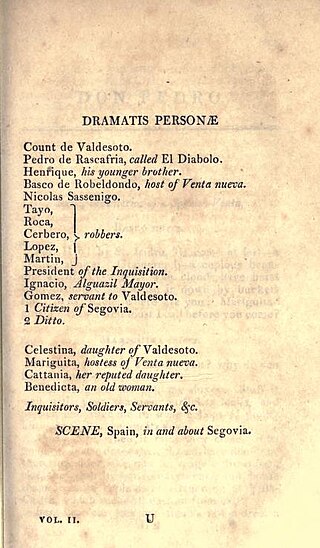
Don Pedro is a tragic play by the British writer Richard Cumberland. It was first staged at the Theatre Royal, Haymarket in London on 23 July 1796. The original cast included James Aickin as Count Valdesoto, Charles Kemble as Henrique, John Palmer as Pedro De Rascifiria, John Bannister as Basco de Robeldondo, Richard Suett as Nicolas Sassenigo, Thomas Caulfield as Tayo, George Wathen as Roca, Robert Palmer as Cerbero and Elizabeth Kemble as Celestina, Sarah Harlowe as Mariguita, Maria Kemble as Cattania and Elizabeth Hopkins as Benedicta. The epilogue was written by George Colman the Younger.
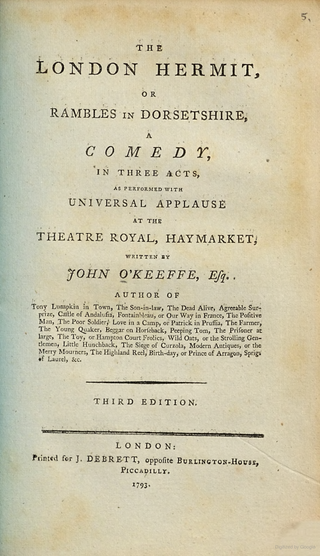
The London Hermit, Or, Rambles in Dorsetshire is a 1793 comedy play by the Irish writer John O'Keeffe. It was staged at the Theatre Royal, Haymarket on 29 June 1793. The original cast included Richard Suett as Whimmy, James Aickin as Old Pranks, John Bannister as Young Pranks, Howard Usher as Barleycorn, Ralph Wewitzer as Barebones, John Henry Johnstone as Tully, William Parsons as Toby Thatch, Lydia Webb as Mrs. Maggs, Elizabeth Kemble as Kitty Barleycorn, Elizabeth Heard as Dian and Jane Powell as Fishwoman. The prologue was written by George Colman the Younger and spoken by William Barrymore. It was staged at the Crow Street Theatre in Dublin in 1795.

Ways and Means; Or, a Trip to Dover is a 1788 comedy play by the British writer and theatre manager George Colman the Younger. It premiered at the Theatre Royal, Haymarket in London with a cast that included John Bannister as Sir David Dunder, John Palmer as Random, James Brown Williamson as Scruple, James Aickin as Old Random, Howard Usher as Paul Peery, Lydia Webb as Lady Dunder and Elizabeth Kemble as Harriet. Its Irish premiere was at the Crow Street Theatre in Dublin on 24 April 1793.

The Rival Sisters is a 1793 tragedy by the Irish writer Arthur Murphy. His final play, it premiered at the Theatre Royal, Haymarket in London on 18 March 1793. It had been first written in 1783 and then published in 1786. It was staged by the company of the Drury Lane company under Richard Brinsley Sheridan who were at the Haymarket while their own theatre was rebuilt. The London cast included Sarah Siddons as Ariadne, Jane Powell as Phaedra, John Philip Kemble as Perithous, Richard Wroughton as Periander, King of Naxos, Robert Palmer as Theseus, John Hayman Packer as Archon and Thomas Caulfield as Aletes. It ran for around nine performances.
Cross Partners is a 1792 comedy play by the British writer Elizabeth Inchbald. It premiered at the Theatre Royal, Haymarket in London on 25 July 1792. The original Haymarket cast included Richard Wilson as Sir Charles Cullender, Thomas King as General Touchwood, James Brown Williamson as George Cleveland, John Palmer as Captain Herbert, Ralph Wewitzer as Corporal Smack, Charles Farley as Pompey, John Henry Johnstone as Thomas, Lydia Webb as Lady Diana Dupely, Charlotte Goodall as Maria Sydney, Louisa Fontenelle as Mrs Mutter and Elizabeth Heard as Louisa Fairfax. It enjoyed a solid run of nine performances.
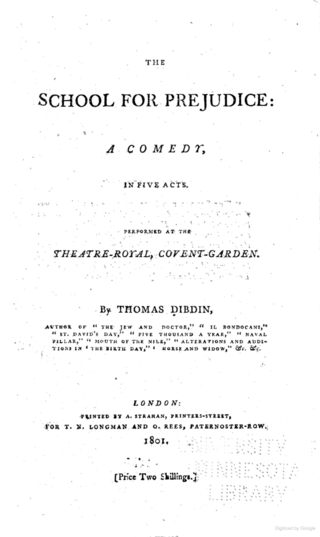
The School for Prejudice is an 1801 comedy play by the English writer Thomas John Dibdin. It premiered at the Theatre Royal, Covent Garden in London on 3 January 1801. The original cast included Joseph Shepherd Munden as Old Liberal, William Thomas Lewis as Frank Liberal, John Fawcett as Ephraim, Charles Murray as Counsellor Friendly, Henry Erskine Johnston as Mildmay, John Emery as John Grouse, Charles Farley as Chevy Chase, Samuel Simmons as Parchment, George Davenport as Landlord, Frances Chapman as Mrs Howard, Harriet Siddons as Marian and Mary Ann Davenport as Miss Liberal. The Irish premiere took place at the Crow Street Theatre in Dublin on 19 February 1802.

Five Miles Off is an 1806 comedy play by the British writer Thomas Dibdin. It premiered at the Theatre Royal, Haymarket in London on 9 July 1806. The original cast included William Chapman as Squire Flail, John Fawcett as Kalendar, Vincent De Camp as Luckless, Charles Mathews as Spriggins, John Liston as Flourish, Jane Powell as Mrs Prue, Sarah Liston as Laura Luckless, and Maria Gibbs as Jenny. Its Irish premiere took place at the Crow Street Theatre in Dublin on 2 August 1816

Guilty or Not Guilty is an 1804 comedy play by the British author Thomas Dibdin. It premiered at the Theatre Royal, Haymarket in London on 26 May 1804. The original cast included Robert Palmer as Major Corslet, William Chapman as Mr. Balance, Robert William Elliston as Edmond Rigid, Vincent De Camp as Sir Harry Pointer, Charles Mathews as Triangle and Maria Gibbs as Nancy.
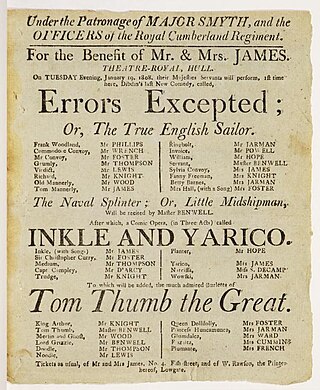
Errors Excepted is an 1807 comedy play by the British writer Thomas Dibdin. It premiered at the Theatre Royal, Haymarket in London on 13 August 1807. The original cast included Charles Mayne Young as Frank Woodland, John Fawcett as Commodore Convoy, Charles Mathews as Lawyer Verdict, John Waddy as Mr Grumley, William Chapman as Old Mannerly, Vincent De Camp as Young Mannerly, Mr. Carles as Gabriel Invioice, John Liston as Richard, Harriett Litchfield as Sylvia, Jane Powell as Betty Barnes, Sarah Liston as Mrs Hall and Maria Gibbs as Fanny Freeman.
Beggar My Neighbour is an 1802 comedy play by the British author Thomas Morton. It premiered in London at the Theatre Royal, Haymarket, then under the management of George Colman, on 10 July 1802. It received a poor reception from audiences.
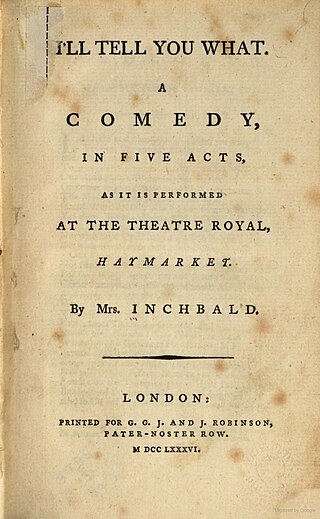
I'll Tell You What is a 1785 comedy play by the English writer Elizabeth Inchbald. It premiered at the Theatre Royal, Haymarket in London on 4 August 1785. The original cast included John Palmer as Major Cyprus, Robert Bensley as Anthony Euston, James Aickin as Colonel Downright, James Brown Williamson as Sir George Euston, John Bannister as Charles Euston, Robert Palmer as Sir Harry Harmless, William Parsons as Mr Euston, Mary Bulkley as Lady Euston and Elizabeth Farren as A Young Lady. The Irish premiere took place at the Smock Alley Theatre in Dublin on 12 December 1785.

The Disbanded Officer; Or, The Baroness of Bruschal is a 1786 comedy play by James Johnstone, inspired by the 1763 German play Minna von Barnhelm by Gotthold Ephraim Lessing. It premiered at the Theatre Royal, Haymarket in London on 24 July 1786. The original London cast included John Palmer as Colonel Holberg, John Bannister as Paul Warmans, Robert Baddeley as Katzenbuckel, William Parsons as Rohf, Charles Farley as Boy, Elizabeth Farren as Baroness of Bruschal, Mary Bulkley as Lisetta and Elizabeth Inchbald as Lady in Mourning. The Irish premiere took place at the Smock Alley Theatre in Dublin on 15 February 1787. Johnstone dedicated the publisher version to Queen Charlotte.

Tit for Tat is a 1786 comedy play by the British writer George Colman the Elder. It premiered at the Theatre Royal, Haymarket in London on 29 August 1786. The original Haymarket cast included John Palmer as Villamour, Cockran Joseph Booth as Old Meanwell, William Davies as Young Meanwell, Robert Palmer as Skipwell, Elizabeth Farren as Florinda and Mary Bulkley as Letty. The Irish premiere took place at the Smock Alley Theatre in Dublin on 26 February 1787 It also subsequently appeared at both the Covent Garden and Theatre Royal, Drury Lane theatres.
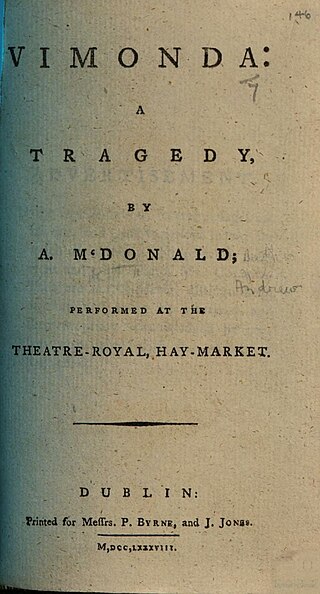
Vimonda is an 1787 tragedy by the Scottish writer Andrew Macdonald. After first appearing at the Theatre Royal, Edinburgh in was then staged at London's Theatre Royal, Haymarket on 5 September 1787. The original Haymarket cast included Elizabeth Kemble as Vimonda, Stephen Kemble as Rothsay, John Bannister as Melville, Robert Bensley as Dundore, James Aickin as Barnard and Frances Barnet Woollery as Alfreda.
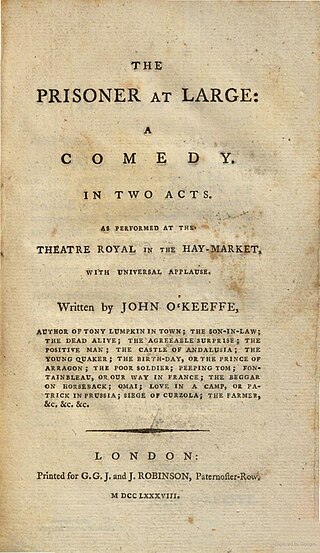
The Prisoner at Large is a 1788 comedy play by the Irish John O'Keeffe. A farce, it premiered as an afterpiece at the Theatre Royal, Haymarket in London on 2 July 1788. The original cast included James Brown Williamson as Lord Esmond, William Henry Moss as Old Dowdle, Ralph Wewitzer as Count Fripon, Robert Palmer as Jack Connor, John Phillimore as Frill, John Edwin as Muns and Elizabeth Kemble as Adelaide. The Irish premiere took place at the Crow Street Theatre in Dublin on 7 August 1789.
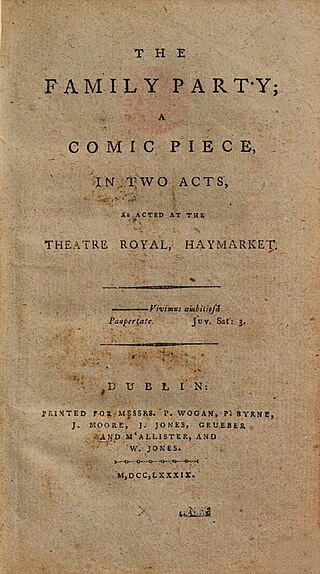
The Family Party is a 1789 comedy play by the British writer George Colman the Younger. A two-act farce, it premiered at the Theatre Royal, Haymarket in London on 11 July 1789. The original Haymarket cast included Robert Baddeley as Old Spriggins, William Davies as Captain Rampart, Robert Palmer as Pinch, John Bannister as Sir Toby Twaddle, Elizabeth Heard as Laura and Lydia Webb as Mrs Malmsley.
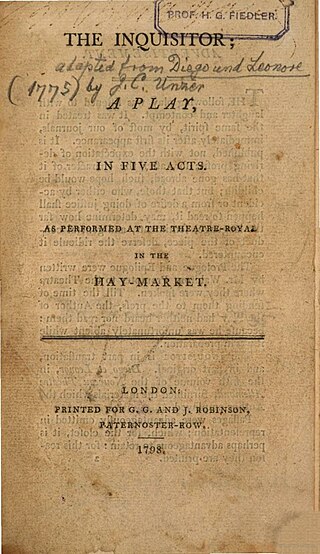
The Inquisitor is a 1798 play by the British writer Thomas Holcroft. It was inspired by the 1775 play Diego und Leonore by Johann August Unzer. It premiered at the Theatre Royal, Haymarket in London on 23 June 1798. The original cast included James Aickin as The Patriarch, Henry Erskine Johnston as Alberto, William Barrymore as Francisco, Charles Kemble as Fernando, Robert Palmer as Lelio, Thomas Caulfield as Alguazil, Maria Theresa Kemble as Leonora, Elizabeth Heard as Violante and Sarah Harlowe as Licia.
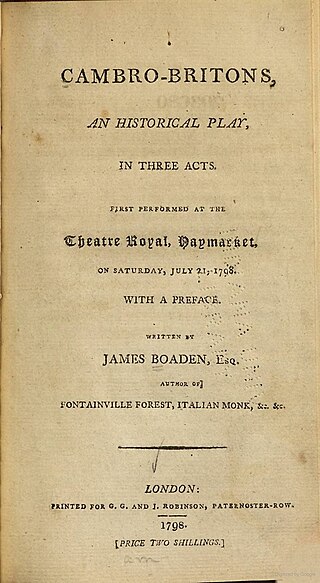
Cambro-Britons is a 1798 historical play by the English writer James Boaden. It premiered at the Theatre Royal, Haymarket in London on 21 July 1798. The original cast included William Barrymore as Llewellyn, Joseph Shepherd Munden as Shenkin, Robert Palmer as Wadwall, Richard Suett as Gwyn, John Henry Johnstone as O'Turloch, Henry Erskine Johnston as Bard, William Davies as King Edward, Charles Kemble as Prince David, Thomas Caulfield as Mortimer, George Davenport as Hereford, George Wathen as Doorkeeper, Maria Theresa Kemble as Elinor, Maria Gibbs as Lady Griffith's Shade and Maria Bland as Winifred.

The Flitch of Bacon is a 1778 comic opera composed by William Shield with a libretto by Henry Bate Dudley. It is inspired by the Flitch of Bacon tradition and takes place at Little Dunmow Priory in Essex. It premiered at the Theatre Royal, Haymarket in London on 17 August 1778. The original cast included William Parsons as Major Benbow, Charles Bannister as Captain Wilson, John Edwin as Tipple and Elizabeth Harpur as Eliza. The Irish premiere took place at the Crow Street Theatre in Dublin on 2 December 1779. The tradition later inspired the 1854 novel The Flitch of Bacon by William Harrison Ainsworth.

The Foundling of the Forest is an 1809 melodrama by the British writer William Dimond, also featuring music composed by Michael Kelly. It premiered at the Theatre Royal, Haymarket in London on 10 July 1809. The original Haymarket cast included Charles Mayne Young as Count De Valmont, Richard Jones as Florian, Edmund John Eyre as Baron Loungeville, Charles Farley as Bertrand, John Liston as L'Eclair, Maria Gibbs as Geraldine, Sarah Liston as Rosabelle, Mary Ann Davenport as Monica and Julia Glover as Unknown Female. The Irish premiere was at the Crow Street Theatre in Dublin in December 1810. It also appeared at the Park Theatre in New York City. Dimond dedicated the published version to Sophia Lee.


















